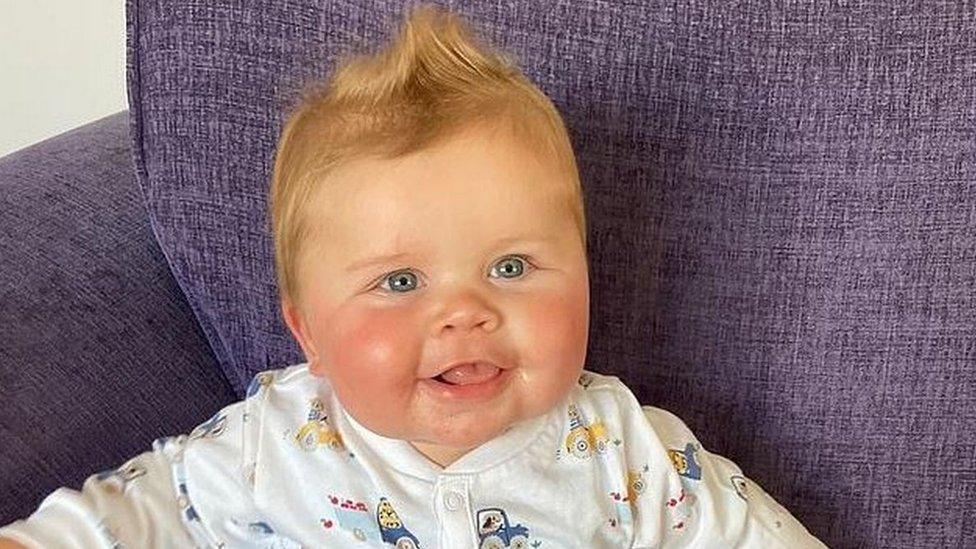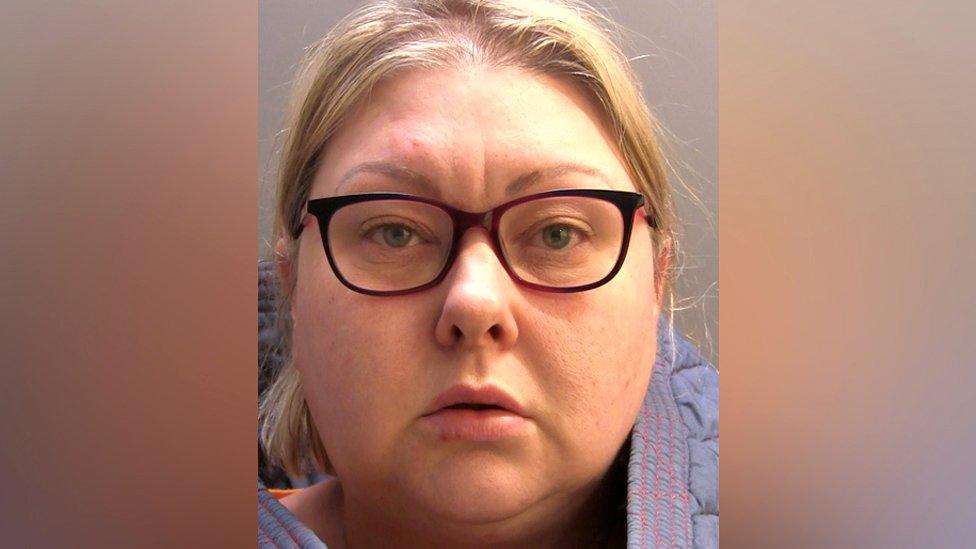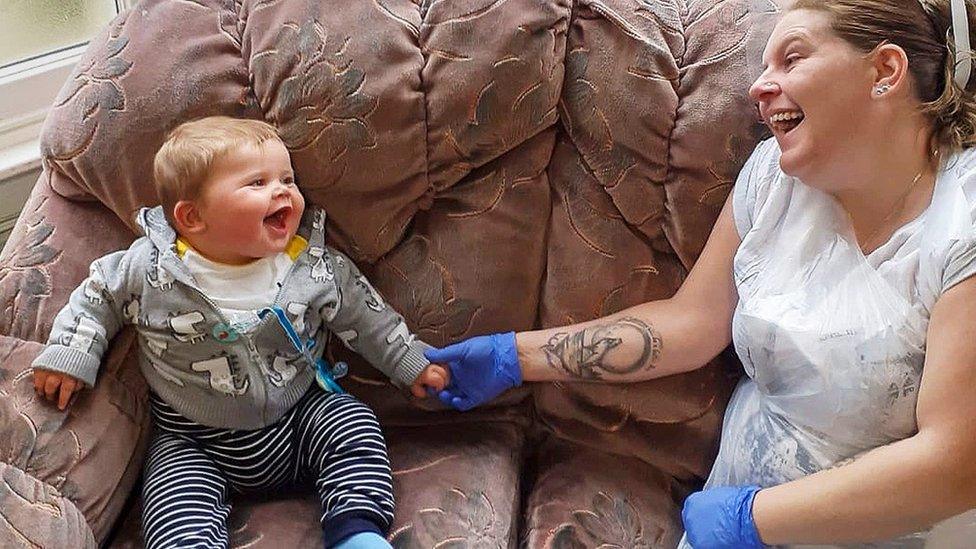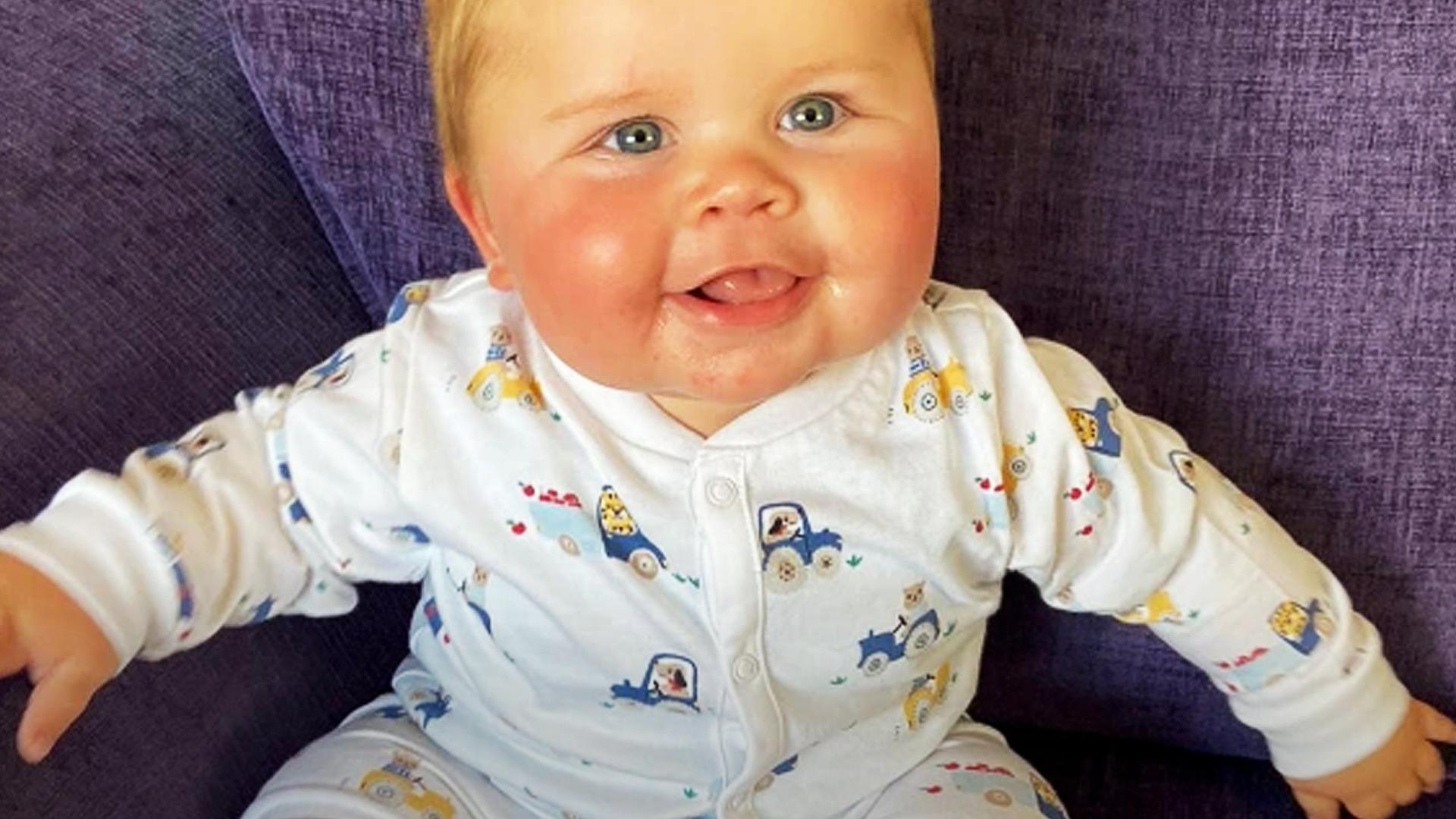Leiland-James Corkill: Killer lied to social workers, report finds
- Published

Leiland-James Corkill suffered a fatal brain injury caused by Laura Castle
A woman who murdered the baby she was trying to adopt lied to professionals about her alcohol use and mental health problems, a report has found.
Laura Castle, 38, killed 13-month-old Leiland-James Corkill at her home in Barrow, Cumbria, in January 2021.
A safeguarding children board review found there were systemic failings in the adoption process and information was not always shared between agencies.
Cumbria County Council said it had already made changes to how it worked.
In response to the findings, the authority said Castle "deliberately and repeatedly misled and lied to social workers about vitally important aspects of her life".
Castle and her husband Scott took in Leiland-James in August 2020 when he was eight months old after he had been taken into care at birth.
The couple had been assessed and approved by the county council's adoption service.

My Baby: Taken, Failed, Killed
Leiland-James was taken from his mother in hospital and placed in care. He went on to be killed by the woman who wanted to adopt him.

However, at the time Castle was having counselling with the organisation First Step about issues including her "low mood, anxiety and anger management".
The adoption team did not make checks with the service as they were under the impression from her, and from her GP, that her therapy was in the past.
First Step was unaware that Castle and her husband had applied to adopt and were being assessed - though they did inform the GP it was working with her - as it is not current practice for an adoption service to contact a counselling agency for information.

Laura Castle admitted responsibility for killing Leiland-James but claimed it was accidental
The information held by First Step revealed that she drank six bottles of wine a week, considerably above the recommended alcohol limit and three times the amount she told adoption assessors she consumed.
Shortly after Leiland-James's placement, Castle was diagnosed with rheumatoid arthritis but social workers were not made aware of her new medical condition.
A concern was raised about her alcohol intake as part of a consultation for a separate health issue.
This information was shared with her GP, but not with any other agency.
'Increasing debt'
The report found the Castles had significant loans and credit card debts but did not have the income to service them.
However, the financial assessment form for the adoption did not ask about the total they owed - it only required the couple to disclose what they were spending on loans and credit cards each month.
That "enabled the family to disguise what they owed and they were only paying the minimum amount each month", the review said.
The form has since changed and there is also a plan to review financial assessments at the time of a match to ensure information is up to date.

Leiland-James seen here with his birth mother Laura Corkill
The NSPCC said the murder was a "pivotal reminder" of the need for national leadership and radical reform of children's social care.
"The report highlights, among other issues, a lack of information sharing between agencies, which we know is a persistent problem," said Clare Kelly, associate head of policy and public affairs.
"It is crucial that the seeking and sharing of information between all agencies involved in child safeguarding and adoption processes is strengthened to spot potential dangers earlier."
'Repeatedly misled'
John Readman, executive director for people at Cumbria County Council, said it fully accepted the report's findings, was deeply sorry for Leiland-James's death and offered condolences to his birth family.
"The Castles went through a full eight-month assessment and approval process involving criminal records checks, multiple references and extensive training," he said.
"No concerns were raised by anyone, in any agency, about their suitability to become adopters.
"Laura Castle deliberately and repeatedly misled and lied to social workers about vitally important aspects of her life, including her mental and physical health, her alcohol use and debts.
"We also know now that relevant information about Laura Castle was not shared between agencies, and that more could have been done to clarify some of the information we were provided with."
Mr Readman said the council had followed "lengthy and intensive" national standards but accepted there were "vulnerabilities in the process" when prospective adopters were untruthful.
Lesley Walker, independent scrutineer with Cumbria Safeguarding Children Partnership, told BBC Radio Cumbria: "I think that they [social workers] need to be challenging information, triangulating and checking out information from a number of sources about adult vulnerabilities.
"There were a number of pieces of information that were not shared as widely as they should've been.
"We've taken steps with a new questionnaire to go into detail about vulnerability and financial situations and seek out information in a robust way."
At her trial, Castle pleaded guilty to manslaughter and told the jury she had shaken Leiland-James because he would not stop crying.
She claimed he hit his head on the armrest of the sofa before he fell off her lap on to the floor.
Prosecutors said Castle killed the boy when she lost her temper and suggested she smashed the back of his head on a piece of furniture.
She was jailed in May for a minimum of 18 years.

Follow BBC North East & Cumbria on Twitter, external, Facebook, external and Instagram, external. Send your story ideas to northeastandcumbria@bbc.co.uk, external.
Related topics
- Published28 July 2022

- Published25 May 2022
